|
|
|
Sort Order |
|
|
|
Items / Page
|
|
|
|
|
|
|
| Srl | Item |
| 1 |
ID:
109936
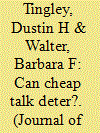

|
|
|
|
|
| Publication |
2011.
|
| Summary/Abstract |
What effect does cheap talk have on behavior in an entry-deterrence game? We shed light on this question using incentivized laboratory experiments of the strategic interaction between defenders and potential entrants. Our results suggest that cheap talk can have a substantial impact on the behavior of both the target and the speaker. By sending costless threats to potential entrants, defenders are able to deter opponents in early periods of play. Moreover, after issuing threats, defenders become more eager to fight. We offer a number of different explanations for this behavior. These results bring fresh evidence about the potential importance of costless verbal communication to the field of international relations.
|
|
|
|
|
|
|
|
|
|
|
|
|
|
|
|
| 2 |
ID:
175335
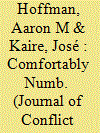

|
|
|
|
|
| Summary/Abstract |
Exposure to a single report about terrorism in the mass media can trigger a range of emotional and political reactions. The consequences of exposure to several terrorism reports in row, however, are a matter of controversy. We examine the effects of prolonged terrorism coverage using an experimental design that combines self-report measures of emotions and political attitudes with instantaneous biometric data on emotions. Consistent with research on nonassociational learning, we find that exposure to multiple videos habituates people to depictions of terrorism: the longer people watch terrorism coverage, the less intense their reactions are to the images of terrorism they see. Some images and videos, however, contribute to this result more than others. This suggests that the ultimate effects of terrorism coverage depend on the interplay between the quantity and quality of reporting, not the quantity alone.
|
|
|
|
|
|
|
|
|
|
|
|
|
|
|
|
| 3 |
ID:
065776
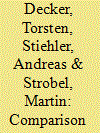

|
|
|
| 4 |
ID:
161607
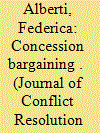

|
|
|
|
|
| Summary/Abstract |
We test experimentally whether dynamic interaction is crucial for concession bargaining. In our complete information bargaining experiments, two parties with asymmetric conflict payoffs try to agree how to share a commonly known pie by bargaining over a finite number of successive trials (agreement attempts). We compare the fully dynamic interaction to one less dynamic and one static protocol. In the quasi-dynamic protocol, later trials merely reveal that so far no agreement has been reached, and in the static protocol, no feedback information is given about earlier trials. We find that neither conflict rate nor efficiency or inequality of agreements differs across protocols. Comparing different numbers of maximal trials shows that more trials render conflict more likely due to less concessions.
|
|
|
|
|
|
|
|
|
|
|
|
|
|
|
|
| 5 |
ID:
152415
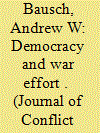

|
|
|
|
|
| Summary/Abstract |
This article uses a laboratory experiment to explore how groups’ internal rules for leader selection affect how leaders select into and fight conflicts. The findings reveal that, counter to expectations, leaders of democratic groups were more likely than leaders of autocratic groups to select into a conflict rather than accept a negotiated settlement. Conditional on conflict occurring, democratic leaders did not mobilize more resources for war than autocratic leaders. However, democratic leaders were less likely to accept a settlement once a war was underway and they expended more effort in the last round of conflict, suggesting once they entered a war they fought for a decisive victory. Domestically, democratic leaders were punished for losing wars more often than autocratic leaders, while winning wars did not benefit democratic leaders significantly.
|
|
|
|
|
|
|
|
|
|
|
|
|
|
|
|
| 6 |
ID:
168174
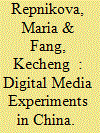

|
|
|
|
|
| Summary/Abstract |
With the rapid decline of traditional media in China, the party-state faces the growing challenge of shaping public opinion online. This article engages with one response to this challenge – a state-sanctioned digital media experiment aimed at creating a new form of journalism that appeals to the public and helps to disseminate Party propaganda. We analyse the emergence of a national success story, Shanghai-based model media outlet Pengpai, and its diffusion across different regions. We argue that the synergy between local officials and media entrepreneurs has propelled Pengpai’s national fame. We further demonstrate that while there has been a cross-national attempt to diffuse this model, it has produced mixed results owing to a number of factors, including the superficial commitment of local officials and media professionals. These findings demonstrate that state-sanctioned decentralized experimentation can deliver unpredictable results in the sphere of media policy, and they further question the capacity of the party-state to effectively reinvent public persuasion in the digital age.
|
|
|
|
|
|
|
|
|
|
|
|
|
|
|
|
| 7 |
ID:
084032
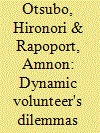

|
|
|
|
|
| Publication |
2008.
|
| Summary/Abstract |
Volunteer's dilemmas that evolve over time are presented and modeled as noncooperative n-person games in extensive form with symmetric players, discrete time, finite horizon, and complete information. Volunteering is costly, thereby giving rise to free riding. Reflecting on the observation that in many naturally occurring social dilemmas it is beneficial to volunteer earlier than later, the model assumes that the payoff to the volunteer and the (higher) payoff to each of the nonvolunteers decrease monotonically over time. The authors construct symmetric and asymmetric subgame perfect equilibria to the game. An experimental study shows that financially motivated subjects who are rewarded contingent on their performance volunteer more readily when the cost of volunteering is relatively low; that they largely fail to coordinate on any of the asymmetric equilibria in which only a single subject volunteers immediately; that they volunteer, on average, earlier than predicted; and that they vary considerably from one another in their inclination to free ride.
|
|
|
|
|
|
|
|
|
|
|
|
|
|
|
|
| 8 |
ID:
183084
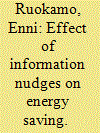

|
|
|
|
|
| Summary/Abstract |
Field experiments have shown that information nudging can help households to save energy, however, the effectiveness varies depending on aspects such as information content, delivery mode and study area. This article evaluates the impacts of information nudges on residential electricity consumption with a randomized field experiment. This opt-in experiment was conducted in Finland. Information was administered via monthly email newsletters and an online energy service platform. The aim is to find out whether i) energy saving tips combined with and without online energy service platform providing electricity consumption information, and ii) peer comparisons (i.e., social norm) influence households’ electricity consumption. The results show a high seasonal variation in the treatment effects within the groups who were registered users of the online energy service platform. Those with access to usage feedback and versatile energy savings tips (without the social norm comparisons) reduced their electricity consumption around 10% in wintertime. The results imply challenges in encouraging energy saving behavior among households less interested in following their electricity consumption.
|
|
|
|
|
|
|
|
|
|
|
|
|
|
|
|
| 9 |
ID:
147834
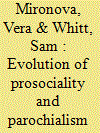

|
|
|
|
|
| Summary/Abstract |
To what extent can prosocial norms (re-)emerge among rival groups following intense intergroup conflict? One school of thought posits that violence can strengthen intragroup bonding norms, entrenching parochialism and sustaining in-group biases. However, recent studies suggest that intergroup bridging norms can also improve once conflict ends. Our research offers insights into how prosocial bridging vs. parochial bonding norms evolve after violence. To measure dynamics of social norms, we employ surveys and dictator game experiments with ethnic treatments which we administered in Bosnia in 2003 and replicated in 2013 using well-balanced samples of ethnic Bosniaks, Croats, and Serbs in a difference-in-difference research design. We find that prosocial bridging norms improve over time. However, we also observe persistent parochial biases in terms of how in-groups are perceived and treated relative to out-groups. Regression analysis shows that intergroup bridging norms are more salient among individuals who reside in ethnically intermixed, institutionally integrated regions of Bosnia, including those who experienced traumatic forms of wartime victimization. Covariate matching on internal displacement and victimization reduces concerns that our results are driven by selection effects. Our findings lend support to the view that integration and intergroup contact among former rivals increases prosociality while partition and social segregation encourage parochialism.
|
|
|
|
|
|
|
|
|
|
|
|
|
|
|
|
| 10 |
ID:
172834
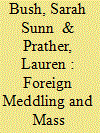

|
|
|
|
|
| Summary/Abstract |
What explains variation in individual preferences for foreign economic engagement? Although a large and growing literature addresses that question, little research examines how partner countries affect public opinion on policies such as trade, foreign aid, and investment. We construct a new theory arguing that political side-taking by outside powers shapes individuals’ support for engaging economically with those countries. We test the theory using original surveys in the United States and Tunisia. In both cases, the potential partner country's side-taking in the partisan politics of the respondents’ country dramatically shapes support for foreign economic relations. As the rise of new aid donors, investors, and trade partners creates new choices in economic partners, our theory and findings are critical to understanding mass preferences about open economic engagement.
|
|
|
|
|
|
|
|
|
|
|
|
|
|
|
|
| 11 |
ID:
163539
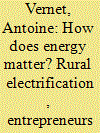

|
|
|
|
|
| Summary/Abstract |
We examine the impact of rural electrification on individuals and businesses within a community in order to test a resource-based theory of entrepreneurship. We show that access to electricity increases average households’ income and entrepreneurial activities. The impact of electricity on entrepreneurial activity has wide-ranging implications for development policy in countries where access to electricity is sparse. Results show a significant difference in entrepreneurial opportunities with respect to firm formation, with the electrified site reporting more new micro-enterprises (33) than the control site (20) after implementation. Electrification affects both households’ income, individuals’ perceptions of their social position, and opportunities for business development. Individuals’ future expectations and entrepreneurial activities are enhanced in the community that receives electricity. We also find evidence that women-led households benefit from electrification more than men-led ones, but this benefit does not eliminate the difference in income between women and men-led household. We discuss implications of the study for entrepreneurship and community social development interventions.
|
|
|
|
|
|
|
|
|
|
|
|
|
|
|
|
| 12 |
ID:
152451
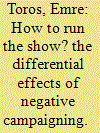

|
|
|
|
|
| Summary/Abstract |
Although the academic literature on negative campaigning is growing, more research is needed to contribute to the theoretical and empirical knowledge on the phenomenon. Accordingly, this article examines the impact of negative political messages on political trust in Turkey. The findings indicate that although exposure to negativity alters the trust level of the citizens, this impact is not uniform and dependent on party identifications.
|
|
|
|
|
|
|
|
|
|
|
|
|
|
|
|
| 13 |
ID:
152452
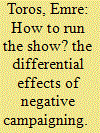

|
|
|
|
|
| Summary/Abstract |
Although the academic literature on negative campaigning is growing, more research is needed to contribute to the theoretical and empirical knowledge on the phenomenon. Accordingly, this article examines the impact of negative political messages on political trust in Turkey. The findings indicate that although exposure to negativity alters the trust level of the citizens, this impact is not uniform and dependent on party identifications.
|
|
|
|
|
|
|
|
|
|
|
|
|
|
|
|
| 14 |
ID:
186326
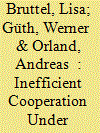

|
|
|
|
|
| Summary/Abstract |
Stochastic uncertainty can cause coordination problems that may hinder mutually beneficial cooperation. We propose a mechanism of ex-post voluntary transfers designed to circumvent these coordination problems and ask whether it can increase efficiency. To test this transfer mechanism, we implement a controlled laboratory experiment based on a repeated Ultimatum Game with a stochastic endowment. Contrary to our hypothesis, we find that allowing voluntary transfers does not lead to an efficiency increase. We suggest and analyze two major reasons for this failure: first, stochastic uncertainty forces proposers intending to cooperate to accept high strategic uncertainty, which many proposers avoid; second, many responders behave only incompletely conditionally cooperatively, which hinders cooperation in future periods.
|
|
|
|
|
|
|
|
|
|
|
|
|
|
|
|
| 15 |
ID:
121845
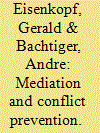

|
|
|
|
|
| Publication |
2013.
|
| Summary/Abstract |
Mediation is a popular process to prevent conflicts over common resources, but there is little clean insight into its effectiveness and mechanisms. Our experimental approach allows for a comprehensive analysis of third-party intervention into potential conflicts and circumvents key problems linked to the analysis of field data. A mediator who credibly threatens punishment in the case of uncooperative behavior achieves the efficient solution in most cases. Similar results are obtained even if the mediator is biased toward one party or has no incentive to intervene. When cooperation fails, communication without credible punishment threats leads to particularly low payouts for the "losing" party.
|
|
|
|
|
|
|
|
|
|
|
|
|
|
|
|
| 16 |
ID:
191850
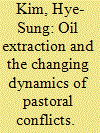

|
|
|
|
|
| Summary/Abstract |
Communities inhabiting the arid and semi-arid areas of eastern Africa have long suffered from and engaged in pastoral conflicts. However, since some countries in the region became oil producers, the conditions affecting pastoral conflicts have changed. This study examines how oil extraction may influence pastoral conflicts by using a survey experiment conducted in Turkana County, Kenya, on a sample of 801 respondents. The study finds that overall, respondents’ perceived risks of pastoral conflicts decrease when they are primed about the consequences of oil extraction leading to fundamental changes in pastoral livelihoods, such as an increase in employment opportunities in the oil sector and rapid social changes. The residents of Turkana view pastoral conflicts as customary as long as pastoralism continues and fundamental changes to pastoralism-based livelihoods originating from oil discovery and extraction may lead to a decrease in the pastoralist population engaging in pastoral conflicts.
|
|
|
|
|
|
|
|
|
|
|
|
|
|
|
|
| 17 |
ID:
105706
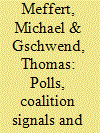

|
|
|
|
|
| Publication |
2011.
|
| Summary/Abstract |
Polls and coalition signals can help strategic voters in multiparty systems with proportional representation and coalition governments to optimise their vote decision. Using a laboratory experiment embedded in two real election campaigns, this study focuses on voters' attention to and perception of polls and coalition signals. The manipulation of polls and coalition signals allows a causal test of their influence on strategic voting in a realistic environment. The findings suggest that active information acquisition to form fairly accurate perceptions of election outcomes can compensate for the advantage of high political sophistication. The theory of strategic voting is supported by the evidence, but only for a small number of voters. Most insincere vote decisions are explained by other factors. Thus, the common practice to consider all insincere voters as strategic is misleading.
|
|
|
|
|
|
|
|
|
|
|
|
|
|
|
|
| 18 |
ID:
157910
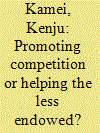

|
|
|
|
|
| Summary/Abstract |
Unequally distributed resources are ubiquitous. The decision of whether to promote competition or equality is often debated in societies and organizations. With heterogeneous endowments, we let subjects collectively choose between a public good that most benefits the less endowed and a lottery contest in which only one individual in a group receives a prize. Unlike standard theoretical predictions, the majority of subjects, including a substantial number of subjects who believe that their expected payoffs are better in the contest, vote for the public good. Our data suggest that people’s collective institutional choices may be driven by inequality-averse concerns. It also suggests that the collective decision to select the option for the public good depends on voting rules.
|
|
|
|
|
|
|
|
|
|
|
|
|
|
|
|
| 19 |
ID:
128966
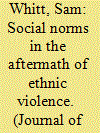

|
|
|
|
|
| Publication |
2014.
|
| Summary/Abstract |
This study considers prospects for the revitalization of social norms after ethnic violence using a behavioral experiment in postwar Bosnia. In the experiment, subjects are asked to distribute a ten-unit monetary sum between two anonymous recipients of random ethnicity. The results indicate a surprisingly high number of egalitarian distributions across ethnicity, which is interpreted as evidence of a norm of fairness. Discriminating behavior in the experiment is explained as a product of ethnic parochialism (rewarding co-ethnics and punishing non-co-ethnics). Overall, the experiment speaks to the resiliency of an important aspect of pro-social behavior after violence-impartiality in the treatment of others.
|
|
|
|
|
|
|
|
|
|
|
|
|
|
|
|
| 20 |
ID:
179294
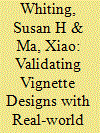

|
|
|
|
|
| Summary/Abstract |
How well do vignette designs capture actual behaviour in the real world? This study employs original survey data featuring both hypothetical vignettes and behavioural questions in order to assess the external validity of descriptive and causal inferences in survey experiments. The survey was conducted in a three-province, probability-proportional-to-size sample of 1,897 rural residents in China and focuses on the legal mobilization of citizens in response to grievances involving land rights. In terms of descriptive inference, we find that relative to the behavioural benchmark, hypothetical vignettes significantly over-estimate legal mobilization in response to a grievance, particularly for higher-cost actions like petitioning the government and litigating in court. We find that data from hypothetical vignettes affect causal inference as well, producing significantly different results regarding the effect of political connections and legal knowledge on legal mobilization. The study makes a contribution by identifying conditions under which hypothetical vignettes are less likely to produce valid inference. It engages a rich literature on disputing and legal mobilization in the field of Chinese politics and helps to resolve debates over the role of political connections and legal knowledge.
|
|
|
|
|
|
|
|
|
|
|
|
|
|
|
|
|
|
|
|
|